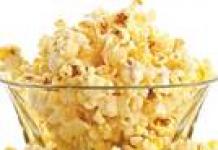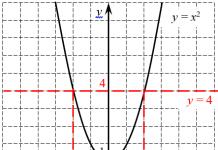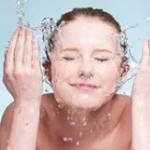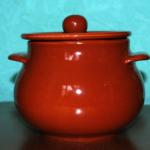All kinds of gels and powders smell, of course, wonderful. And the dishes seem to be washed well. But they are made from refined products, and almost all household chemicals that are sold to us are toxic. It pollutes the environment, and besides, it is not completely washed off the plates and pans, no matter how much you rinse the dishes.
Surfactants contained in detergents enter our stomachs, and there they behave in the same way as on the surface of dishes that need to be washed - they corrode everything. Bottom line: gastritis, ulcers, allergies and a lot of other diseases.
Eco-friendly dishwashing detergents have now appeared in stores, but they are not always effective, and they are expensive. Meanwhile, there are natural remedies that can perfectly wash a mountain of dishes. Most of them are in any kitchen, take and use.
Mustard
It perfectly absorbs all the fat. Therefore, it is the best detergent for washing greasy dishes and pans. You can act in different ways: dip a wet sponge into a saucer with mustard, apply it to the dishes, wipe the dishes with a paste of mustard and water. And you can draw hot water into the sink or basin, add a couple of teaspoons of mustard and wash the dishes in this solution with an ordinary sponge - everything is perfectly washed.
By the way, mustard can also collect non-washable chemicals from dishes. At the very least, it will wash them off much more effectively than just water. Therefore, some housewives wash heavily soiled dishes first with a small amount of detergent, and then douse with mustard.
Soda
It cleans pans and trays, washes away grease, deodorizes and neutralizes the acidic taste of water. Baking soda can be used to clean kettles, wash dishes like paste, and rub cutlery. But baking soda can scratch special coatings on dishes, such as Teflon. Therefore, it must be used selectively.
Baking soda can be added to a soap solution (made from laundry soap). It will further enhance the remedy.
In addition to baking soda, there is also household. It is caustic, although harmless, so it is better to use gloves when working with laundry soda. This soda is a stronger alkali than baking soda. In addition, its abrasive properties are higher. To wash smoked pans, you need to pour a glass of soda into the bucket, put the dishes in the solution and leave overnight.
Vinegar
It will not cope with fat alone, but it will help to disinfect dishes, destroy mold and viruses. It is for the purpose of disinfection that you can sprinkle washcloths and sponges for washing dishes with vinegar, add it to cleaning pastes.
Vinegar works well on staining glassware, for example, you can wipe glasses with it.
Laundry soap
A universal remedy especially loved by housewives. On women's forums, they even devote separate branches to him, consisting of declarations of love and enumeration of merits. Laundry soap can really replace a huge battery of household chemicals. Including dishwashing liquid.
Its advantage is that such soap is made from organic substances, it is not a petroleum product, so it does not pollute the environment. It does not add dyes, preservatives, fragrances.
Soap is well washed off the plates, does not leave a smell. It is used to make homemade dishwashing liquids or use it in its usual, solid form. In any case, laundry soap perfectly removes grease and other contaminants.
bamboo napkin
Such napkins are quite expensive, they are difficult to buy. But on the other hand, they perfectly remove grease and dirt from plates, even without any detergents, both environmentally friendly and not very. The wipes are easy to use - you only need to wash them periodically, and they will last for quite a long time.
Ash
A hard-to-reach tool, unless you are in the country or on a hike. From the fire or in the stove you can get as many excellent detergents as you like. Ash absorbs grease and also has a slightly abrasive effect, so it can be used to clean baking sheets or baking dishes. But, of course, you should not use it for Teflon coating.
The method of use is simple: pour a little ash on the surface to be washed, add a few drops of water and wash the dishes with the resulting paste.
By the way, ash can help if your enameled teapot or pan has darkened. It is necessary to fill the dishes 1/3 with water, pour water and boil it all for an hour. Then rinse the dishes.
Paste for cleaning pots, pans and other heavily soiled utensils
¼ bar of laundry soap (or remnants)
1 glass of hot water
1.5 tbsp soda
1.5 tbsp mustard
2 tbsp ammonia (4 ampoules)
Step 1. Grate laundry soap and pour half the water. Put in a water bath (or microwave).
Step 2 While the soap is melting, add the remaining water to it. You need to get the consistency of sour cream or gel.
Step 3 After the soap has dissolved, cool it a little and add soda and mustard. Mix.
Step 4. Add ammonia. Wear gloves when handling alcohol and open a window.
Step 5 Beat the whole mixture quickly with a mixer. The formed foam - to remove.
Step 6. Pour the resulting mass into containers with a wide neck and lids. This is done very quickly so that the volatile ammonia does not evaporate. Wait a few hours for the gel to thicken.
An impressive amount of time of a modern person is spent on washing dishes. On the shelves in stores, an abundance of bottles of liquid products that facilitate this work. To great joy, housewives are now concerned not only with the smell and price category of such products, but also with the impact on health: human and our planet.
Why are dishwashing detergents dangerous?
The main component of household chemicals for washing dishes is a variety of surface-active substances (surfactants), which determine their washing properties. Surfactants are divided into:
- cationic (CSAV)
- anionic (AS)
- amphoteric (amphoteric)
- non-ionic (nonionic surfactants)
These chemical compounds are extremely difficult to wash off from the surface of the dishes: one plate must be rinsed at least 15 times, completely immersed in clean water. Can you imagine how much water you need? (After all, even in nature studies classes at school, we were told how important it is to save water resources!) Even if the plate creaks after rinsing, this does not mean at all that the substances have been removed from the surface.
There are dissolved surfactants in the water droplets on the dishes. After drying, these substances still remain, forming a film on the surface. When we put food in this dish, the surfactants join the food and are safely eaten by us. There is a saying that a person consumes half a liter of dishwashing liquid in a year!
What consequences? Unpredictable. Synthetic surfactants in dishwashing detergents. When ingested, they cause gradual poisoning. It all starts with allergic reactions, and can end with the development of tumors in the gastrointestinal tract - the fact is that the decay products of many surfactants are carcinogens.
Not only that, when the surfactant comes into contact with the skin, the protective barrier is destroyed, the compounds are absorbed into the blood and are carried throughout the body.
Damage to the body is caused not only by the surfactants of detergents, but also by chemical flavorings and preservatives. When washing dishes, a person actively inhales fragrances, which, according to scientists, leads to many diseases of the respiratory system, including asthma.
Waste waters with surfactants dissolved in them cause great damage to the environment. Detergents with surfactants with a long decay period are more harmful. While the compounds decompose, they contribute to the waterlogging of water bodies, oxygen starvation of their inhabitants, and subsequently to the death of the latter. Therefore, the shorter the decay period of the surfactant, the safer the product for the environment. The trouble is, manufacturers do not write the names of surfactants in the composition.
The most aggressive are anionic surfactants, although some of them have good biodegradability (up to 90%). Non-ionic completely decompose, that is, they turn into carbon dioxide and water, so they do less harm to the environment.
How to protect yourself from the harmful effects of dishwashing detergents
Of course, the less chemistry comes into contact with the human body, the better for his health. No one encourages readers to completely abandon detergents, but some tips can help reduce the harmful effect.
When washing dishes, it would be great to take care of the environment. To do this, choose safe means.
And also let's notice how much water we spend in the process of cleaning the kitchen? Using a special basin for washing and rinsing dishes will not only save you money on paying for water supply. This is one way to take care of what we have been given.
Dishwashing detergents are highly polluting and harmful to health. We learned how to wash dishes without harming the environment. "Tips for a novice housewife" continues ...
All kinds of gels and powders smell, of course, wonderful. And the dishes seem to be washed well. But they are made from refined products, and almost all household chemicals that are sold to us are toxic. It pollutes the environment, and besides, it is not completely washed off the plates and pans, no matter how much you rinse the dishes.
Surfactants contained in detergents enter our stomachs, and there they behave in the same way as on the surface of dishes that need to be washed - they corrode everything. Bottom line: gastritis, ulcers, allergies and a lot of other diseases.
Eco-friendly dishwashing detergents have now appeared in stores, but they are not always effective, and they are expensive. Meanwhile, there are natural remedies that can perfectly wash a mountain of dishes. Most of them are in any kitchen, take and use.

It perfectly absorbs all the fat. Therefore, it is the best detergent for washing greasy dishes and pans. You can act in different ways: dip a wet sponge into a saucer with mustard, apply it to the dishes, wipe the dishes with a paste of mustard and water. And you can draw hot water into the sink or basin, add a couple of teaspoons of mustard and wash the dishes in this solution with an ordinary sponge - everything is perfectly washed.
By the way, mustard can also collect non-washable chemicals from dishes. At the very least, it will wash them off much more effectively than just water. Therefore, some housewives wash heavily soiled dishes first with a small amount of detergent, and then douse with mustard.
Soda

It cleans pans and trays, washes away grease, deodorizes and neutralizes the acidic taste of water. Baking soda can be used to clean kettles, wash dishes like paste, and rub cutlery. But baking soda can scratch special coatings on dishes, such as Teflon. Therefore, it must be used selectively.
Baking soda can be added to a soap solution (made from laundry soap). It will further enhance the remedy.
In addition to baking soda, there is also household. It is caustic, although harmless, so it is better to use gloves when working with laundry soda. This soda is a stronger alkali than baking soda. In addition, its abrasive properties are higher. To wash smoked pans, you need to pour a glass of soda into the bucket, put the dishes in the solution and leave overnight.
Vinegar
It will not cope with fat alone, but it will help to disinfect dishes, destroy mold and viruses. It is for the purpose of disinfection that you can sprinkle washcloths and sponges for washing dishes with vinegar, add it to cleaning pastes.
Vinegar works well on staining glassware, for example, you can wipe glasses with it.

Laundry soap
A universal remedy especially loved by housewives. On women's forums, they even devote separate branches to him, consisting of declarations of love and enumeration of merits. Laundry soap can really replace a huge battery of household chemicals. Including dishwashing liquid.
Its advantage is that such soap is made from organic substances, it is not a petroleum product, so it does not pollute the environment. It does not add dyes, preservatives, fragrances.
Soap is well washed off the plates, does not leave a smell. It is used to make homemade dishwashing liquids or use it in its usual, solid form. In any case, laundry soap perfectly removes grease and other contaminants.

bamboo napkin
Such napkins are quite expensive, they are difficult to buy. But on the other hand, they perfectly remove grease and dirt from plates, even without any detergents, both environmentally friendly and not very. The wipes are easy to use - you only need to wash them periodically, and they will last for quite a long time.

Ash
A hard-to-reach tool, unless you are in the country or on a hike. From the fire or in the stove you can get as many excellent detergents as you like. Ash absorbs grease and also has a slightly abrasive effect, so it can be used to clean baking sheets or baking dishes. But, of course, you should not use it for Teflon coating.
The method of use is simple: pour a little ash on the surface to be washed, add a few drops of water and wash the dishes with the resulting paste.
By the way, ash can help if your enameled teapot or pan has darkened. It is necessary to fill the dishes 1/3 with water, pour water and boil it all for an hour. Then rinse the dishes.

Paste for cleaning pots, pans and other heavily soiled utensils
¼ bar of laundry soap (or remnants)
1 glass of hot water
1.5 tbsp soda
1.5 tbsp mustard
2 tbsp ammonia (4 ampoules)
Step 1. Grate laundry soap and pour half the water. Put in a water bath (or microwave).
Step 2 While the soap is melting, add the remaining water to it. You need to get the consistency of sour cream or gel.
Step 3 After the soap has dissolved, cool it a little and add soda and mustard. Mix.
Step 4. Add ammonia. Wear gloves when handling alcohol and open a window.
Step 5 Beat the whole mixture quickly with a mixer. The formed foam - to remove.
Step 6. Pour the resulting mass into containers with a wide neck and lids. This is done very quickly so that the volatile ammonia does not evaporate. Wait a few hours for the gel to thicken.
Mar 17, 2015 tigress…s
Dishes, and they had never even heard of automatic machines. But with dirty cups, plates and fat in a frying pan, they coped no worse than modern devices. The question arises, how to replace bright expensive jars and is it possible to wash dishes with laundry soap, which costs mere pennies?
Criterias of choice
Despite the appearance of dishwashers on sale, not everyone has the means to buy it. And those who are not deprived of finances are sometimes in no hurry to purchase. They justify this step by saying that it is easier to wash one cup and plate than to wait for a whole set to be loaded.
And why spend money on expensive products designed for dishwashers, if you can quickly wash everything with your hands? In this case, how can dirt be removed and is it possible to wash dishes with laundry soap without losing quality?
On the shelves of hardware stores you can find a wide variety of products designed to destroy grease and dirt on kitchen utensils. The variety of prices and products is simply amazing. Sometimes advertising promises that the treasured liquid will cope with the problem in a matter of seconds without harming health.
The criteria for choosing when buying each person vary, but you should still adhere to the following tips:
- The product should quickly cope with fat, but at the same time not irritate the skin on the hands.
- Be thick enough and economical.
- The liquid should be completely washed off, leaving no traces and streaks, and be safe.
- Not the last role is played by the aroma, the appearance of the packaging and the cost.

It is better to choose fragrance-free dishwashing detergents if one of the family members has allergic reactions. In any case, before buying, you should feel free to smell the sample. If at the same time there are unpleasant sensations, then it is better to choose another product. Of course, it is difficult to find a remedy without preservatives and flavorings, so you should carefully study the composition on the packaging of laundry soap.
If the hostess is an adherent of folk remedies, then you can make soap yourself.
The composition of the brown bar
A reasonable question often arises whether it is possible to wash dishes with laundry soap. Certainly yes. Laundry soap, made in accordance with GOST, consists only of natural ingredients. No harmful surfactants or phosphates are added to it.
What is laundry soap made of? The basis is fats, oils of vegetable origin and sodium salts. Classic soap does not contain fragrances, preservatives and dyes. Therefore, you can not be afraid that the remnants of the product on the dishes will harm. Also, the soap solution is poured out without fear, because its composition is harmless to the environment.
The use of laundry soap can also be advised to allergy sufferers. At the same time, it effectively cleanses and even has a bactericidal effect.

Such a different laundry soap
On standard pieces, you can often see numbers, for example, laundry soap "72". They mean the percentage of fatty acids in a piece. You can also find other numbers that start from 65. Laundry soap "72" is the highest in terms of fat content. Efficiency and the so-called "soapiness" depend on it. This tool has a characteristic brown color.
Now on sale there are quite nice white pieces. Despite their aesthetic appearance, such soaps must be treated with caution. The fact is that for a spectacular appearance and a pleasant aroma, dyes and flavors are added to it. Therefore, such a composition of such a bar becomes unnatural. When choosing, you must carefully study the information on its packaging.
Another novelty is liquid laundry soap. However, such a product has nothing to do with the classic bar. If you study the composition, you can find not only dyes and fragrances, but also chemical elements. This product is suitable for washing clothes, but it is not recommended to use it as a dishwashing detergent.
Cons of laundry soap
Despite the advantages of a brown bar and the naturalness of the composition, this soap has its drawbacks. So, if hard water flows from the tap, then when washing dishes, soda should be added to the soap solution. Otherwise, there will be little foam, which will lead to a loss in the effectiveness of fatty acids.
Laundry soap also dries out the skin. Therefore, it is recommended to add glycerin to the prepared product or use special gloves. It is necessary to wash off the product from hands and dishes carefully, because sodium salts are not always safe when they enter the gastrointestinal tract.
Ways to wash dishes with laundry soap
The procedure is quite simple, it just requires some preparation. How to properly wash dishes with soap:
- it is better to arrange a sink in a small basin or sink with a cork;
- soap works better in warm water;
- washing dishes in hard water will lead to streaks and reduce the effectiveness of the soap solution, so you should add a little baking soda to the sink;
- rinse the dishes only under running water, completely washing off the solution;
- if you want to remove fat from pans, it is recommended to first clean it off with a napkin.
Soot spots will disappear if you collect a little water, grate laundry soap and put on a slow fire. After boiling, the burner must be turned off. As the water cools, the soot will gradually go away and it can be easily washed off.

Liquid detergent from laundry soap
Despite its effectiveness and low cost, many housewives are not ready to exchange convenient liquid dishwashing detergents for an uncomfortable brown bar of laundry soap. Therefore, you can prepare your own liquid, the composition of which will not contain harmful substances. The resulting gel can also be used as a detergent for washing children's dishes. You can use the following recipe:
- Half of the bar must be grated on a fine grater.
- Next, the soap needs to be melted. To do this, you can pour some hot water into a bowl, and put the solution in the microwave. Some heat soap in a water bath.
- After that, you need to add another half liter of hot water, and then leave the solution to cool.
- To protect the skin of the hands, add four tablespoons of glycerin to the soap. It is easy to find in any pharmacy. To prevent the product from spoiling, you need to add one tablespoon of vodka to it. The solution should be shaken well.
- For convenience, it is better to pour the prepared home remedy into a container with a dispenser. For this, any bottle of store-bought liquid, thoroughly washed and dried, is suitable.
- It is necessary to pour the prepared product while it has not cooled down yet. Then the liquid will become viscous, resembling a gel.

Useful Supplements
For greater efficiency, some housewives use little tricks. So, if you need to get a detergent for washing children's dishes, you can add mustard to the solution. It helps to better cope with fat and has an antibacterial effect without harming the health of the child.
To remove stuck pieces of food and soot, experienced housewives advise adding coffee grounds to the soap. It should be noted that such a solution has the properties of a liquid with abrasive substances and is not suitable for cleaning Teflon.
To give a pleasant aroma, you can add a few drops of essential oil to the soap.
Paste for better cleansing
Laundry soap is tested by housewives and time. It can replace a large number of different means. Its undeniable dignity in the composition. Laundry soap consists only of organic components and is not a product of oil refining. Therefore, it is safe for humans and the environment.
From laundry soap, you can prepare both a liquid solution and a thick paste. It helps to get rid of fat and rinses well from plates and cups. Paste for washing dishes from laundry soap is prepared according to the following recipe:
- A bar of laundry soap should be grated.
- Stirring constantly, pour in a glass of hot water.
- Then you need to add 100 g of soda, 10 g of glycerin, 50 g of mustard and a little lemon zest to the product.
- The resulting paste must be thoroughly beaten and transferred to a convenient container. At first, the product will become like a gel, but after cooling it will turn into a paste. Some compare it with the famous "Palmyra", which our grandmothers loved so much.

When preparing detergent from laundry soap, you should not strive to maintain exact proportions. By experimenting, you can achieve the desired consistency and get the best result. Essential oils work well as fragrances. They are not only harmless, but also have different properties that help in the fight against pollution.

















